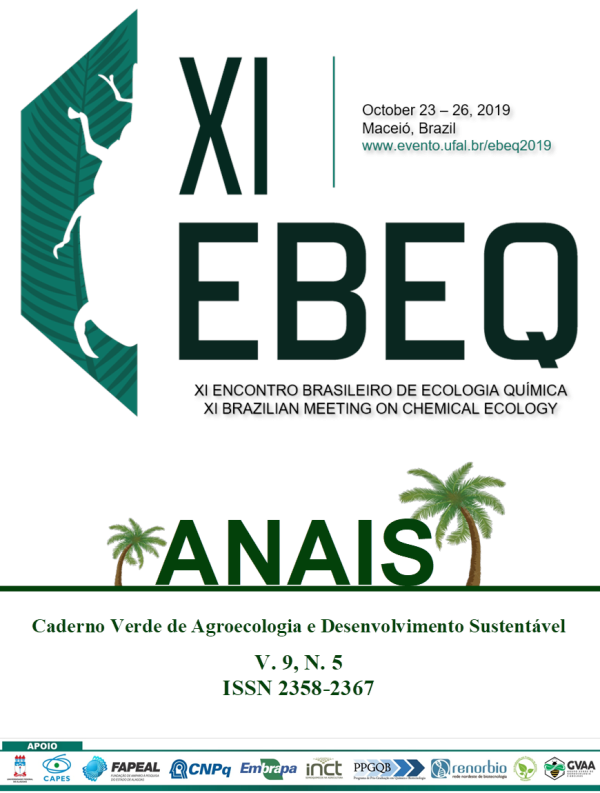THE ROLE OF GUSTATION AND PROBOSCIS ON OVIPOSITION BEHAVIOR OF THE SOUTHERN HOUSE MOSQUITO
Keywords:
Culex quinquefasciatus, 4-ETHYLPHENOL, GUSTATORY STIMULANT, OLFACTORY ATTRACTANT, EGG LAYING.Abstract
Understanding the behavioral ecology of mosquitoes is critical to the development of monitoring and management tools. Taste is known to affect the behavior of mosquitoes, but information about their role in oviposition is scarce. 4-Ethylphenol (4EP) elevates mosquito oviposition and is commonly referred to as an olfactory stimulant. However, few studies provide evidence to support this conclusion, and even fewer have tested the role of 4EP as a taste stimulant. Here we use the southern house mosquito (Culex quinquefasciatus) as a model to address these questions. In oviposition tests, Cx. quinquefasciatus preferred a 4EP solution over a control solution (solvent) (p=0.0021, 40 gravid females/cage, n=18 cages). In olfaction tests, it was inferred that this preference was caused by taste stimuli since 4EP and control solutions were selected at similar rates by mosquitoes (p=0.84, n=14). Subsequently, 4EP olfactory cues, olfactory and taste cues, or control (solvent) were offered. In two-choice trials, mosquitoes clearly preferred ovipositing at sites with olfactory and taste cues compared to sites containing only olfactory cues or a control (p≤0.0016, n=30). Similar results were observed in four-choice trials (p<0.0001, n=24), confirming the relevance of 4EP as a taste and its irrelevance as a smell for the gravid mosquitoes. To determine the organ involved in such gustatory stimulus, we compared the oviposition of mosquitoes whose proboscis were ablated with that of control (intact) mosquitoes. Ablated and control mosquitoes had similar oviposition capacities (p=0.48, n=8). However, ablated females did not respond to 4EP (p=0.45, n=8), while control females strongly preferred 4EP (p=0.003, n=8). It is concluded that 4EP does not work as a short-range oviposition attractant for Cx. quinquefasciatus, as has been widely discussed in the literature. Instead, 4EP acts as a gustatory stimulant for oviposition and is critically detected by the mosquito proboscis.
Downloads
Published
How to Cite
Issue
Section
License
Termo de cessão de direitos autorias
Esta é uma revista de acesso livre, em que, utiliza o termo de cessão seguindo a lei nº 9.610/1998, que altera, atualiza e consolida a legislação sobre direitos autorais no Brasil.
O(s) autor(es) doravante designado(s) CEDENTE, por meio desta, publica a OBRA no Caderno Verde de Agroecologia e Desenvolvimento Sustentável, representada pelo Grupo Verde de Agroecologia e Abelhas (GVAA), estabelecida na Rua Vicente Alves da Silva, 101, Bairro Petrópolis, Cidade de Pombal, Paraíba, Brasil. Caixa Postal 54 CEP 58840-000 doravante designada CESSIONÁRIA, nas condições descritas a seguir:
O CEDENTE declara que é (são) autor(es) e titular(es) da propriedade dos direitos autorais da OBRA submetida.
O CEDENTE declara que a OBRA não infringe direitos autorais e/ou outros direitos de propriedade de terceiros, que a divulgação de imagens (caso as mesmas existam) foi autorizada e que assume integral responsabilidade moral e/ou patrimonial, pelo seu conteúdo, perante terceiros.
O CEDENTE mantêm os direitos autorais e concedem à revista o direito de divulgação da OBRA, com o trabalho simultaneamente licenciado sob a Licença Creative Commons do tipo atribuição CC-BY.
O CEDENTE têm autorização para distribuição não-exclusiva da versão do trabalho publicada nesta revista.
O CEDENTE têm permissão e são estimulados a publicar e distribuir seu trabalho online (ex.: em repositórios institucionais ou na sua página pessoal) a qualquer ponto antes ou durante o processo editorial, já que isso pode gerar alterações produtivas, bem como aumentar o impacto e a citação do trabalho publicado.








